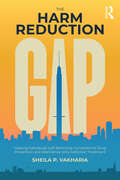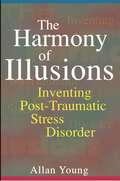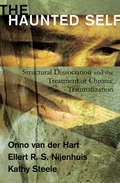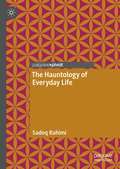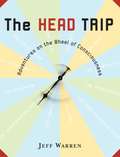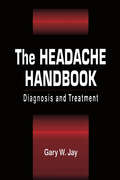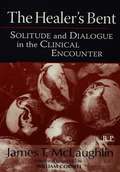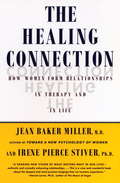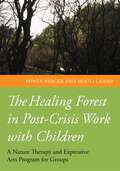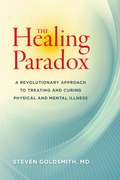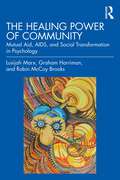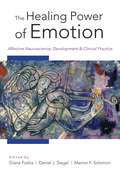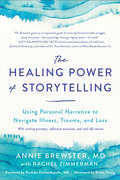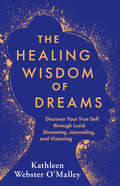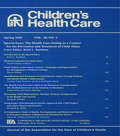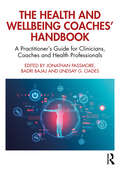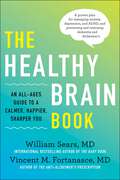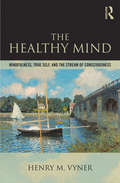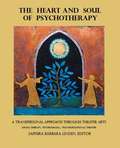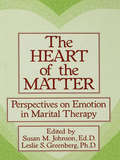- Table View
- List View
The Harm Reduction Gap: Helping Individuals Left Behind by Conventional Drug Prevention and Abstinence-only Addiction Treatment
by Sheila P. VakhariaThis long-awaited book teaches how harm reduction can be a safety net for people with substance use disorders that our current addiction treatment rejects, abandons, and leaves behind. Harm reduction is an approach to helping people who engage in high-risk activities to develop the skills and strategies to keep them and their communities safe. This can include the provision of sterile equipment, low-threshold and low-barrier care, and the acceptance of non-abstinence goals in treatment. In this novel guide, Dr. Vakharia discusses the shortcomings of the dominant “Just Say No” drug prevention messages and abstinence-only treatment approaches, introduces harm reduction strategies and technologies borne from people who use drugs themselves, and suggests various policy options available as alternatives to the current policies that criminalize drugs, drug-using equipment, and the settings in which people use drugs. The final chapter calls on the reader to destigmatize drug use and support efforts to reform our drug policies. By highlighting the large gap in our current approach to substance use – the harm reduction gap – this book is the first step for those interested in learning more about the limitations of our current approach to drug use and how to support local efforts to ensure people who use drugs and their communities can stay safe.
The Harmony of Illusions: Inventing Post-Traumatic Stress Disorder
by Allan YoungAs far back as we know, there have been individuals incapacitated by memories that have filled them with sadness and remorse, fright and horror, or a sense of irreparable loss. Only recently, however, have people tormented with such recollections been diagnosed as suffering from "post-traumatic stress disorder." Here Allan Young traces this malady, particularly as it is suffered by Vietnam veterans, to its beginnings in the emergence of ideas about the unconscious mind and to earlier manifestations of traumatic memory like shell shock or traumatic hysteria. In Young's view, PTSD is not a timeless or universal phenomenon newly discovered. Rather, it is a "harmony of illusions," a cultural product gradually put together by the practices, technologies, and narratives with which it is diagnosed, studied, and treated and by the various interests, institutions, and moral arguments mobilizing these efforts. This book is part history and part ethnography, and it includes a detailed account of everyday life in the treatment of Vietnam veterans with PTSD. To illustrate his points, Young presents a number of fascinating transcripts of the group therapy and diagnostic sessions that he observed firsthand over a period of two years. Through his comments and the transcripts themselves, the reader becomes familiar with the individual hospital personnel and clients and their struggle to make sense of life after a tragic war. One observes that everyone on the unit is heavily invested in the PTSD diagnosis: boundaries between therapist and patient are as unclear as were the distinctions between victim and victimizer in the jungles of Southeast Asia.
The Harvard Lectures
by Anna FreudThis remarkable series of introductory lectures on psychoanalysis is, in fact, a lucid, elegant and profound overview of classic psychoanalytic theory, in which the main aspects of psychoanalytic psychology are spelt out. The simple and clear language characteristic of the author's lecturing, the precision of her concepts and their mutual relationships, and their liveliness of this comprehensive synthesis make for a thought provoking, exciting reading experience.
The Haunted Self: Structural Dissociation and the Treatment of Chronic Traumatization (Norton Series on Interpersonal Neurobiology) (Norton Series on Interpersonal Neurobiology #0)
by Onno Van Hart Kathy Steele Ellert R. NijenhuisLife is an ongoing struggle for patients who have been chronically traumatized. They typically have a wide array of symptoms, often classified under different combinations of comorbidity, which can make assessment and treatment complicated and confusing for the therapist. Many patients have substantial problems with daily living and relationships, including serious intrapsychic conflicts and maladaptive coping strategies. Their suffering essentially relates to a terrifying and painful past that haunts them. Even when survivors attempt to hide their distress beneath a facade of normality--a common strategy--therapists often feel besieged by their many symptoms and serious pain. Small wonder that many survivors of chronic traumatization have seen several therapists with little if any gains, and that quite a few have been labeled as untreatable or resistant. In this book, three leading researchers and clinicians share what they have learned from treating and studying chronically traumatized individuals across more than 65 years of collective experience. Based on the theory of structural dissociation of the personality in combination with a Janetian psychology of action, the authors have developed a model of phase-oriented treatment that focuses on the identification and treatment of structural dissociation and related maladaptive mental and behavioral actions. The foundation of this approach is to support patients in learning more effective mental and behavioral actions that will enable them to become more adaptive in life and to resolve their structural dissociation. This principle implies an overall therapeutic goal of raising the integrative capacity, in order to cope with the demands of daily life and deal with the haunting remnants of the past, with the "unfinished business" of traumatic memories. Of interest to clinicians, students of clinical psychology and psychiatry, as well as to researchers, all those interested in adult survivors of chronic child abuse and neglect will find helpful insights and tools that may make the treatment more effective and efficient, and more tolerable for the suffering patient.
The Hauntology of Everyday Life
by Sadeq RahimiThis volume develops a comprehensive framework for applying the theory of hauntology to everyday life from ethnographic and clinical points of view. The central argument of the book is that all human experience is fundamentally haunted, and that a shift from ontological theory of subjective experience to a hauntological one is necessary and has urgent implications. Building on the notion of hauntology outlined by Derrida, the discussions are developed within the frameworks of psychoanalytic theory, specifically Jacques Lacan’s object relational theory of ego development and his structural reading of Freud’s theory of the psychic apparatus and its dynamics; along with the Hegelian ontology of the negative and its later modifications by 20th century philosophers such as Heidegger and Derrida; and the semiotics of difference introduced by Saussure and worked by Jakobson and others. This book argues and demonstrates the immediate relevance of hauntological analysis in everyday life by providing a microanalysis of the roles played by power, meaning and desire; and by using vignettes and data from ethnographic research and clinical settings, as well as references to literature, movies and other cultural products.
The Head Trip: Adventures on the Wheel of Consciousness
by Jeff WarrenA world at once familiar and unimaginably strange exists all around us, and within us -- it is the vast realm of consciousness. In The Head Trip, science journalist Jeff Warren explores twelve distinct, natural states of consciousness available to us in a twenty-four-hour day, each state offering its own kind of knowledge and insight -- its own adventure.
The Headache Handbook: Diagnosis and Treatment
by Gary W. JayThe Headache Handbook: Diagnosis and Treatment helps both generalist and specialist clinicians, including family practitioners, chiropractors, and neurologists, to understand headache, possibly the most ubiquitous symptom in medicine. This comprehensive work covers the myriad of differences among headache patients and the need for accurate fact gathering and physical and neurological examinations. Topics include anatomy and physiology of headache; evaluation and treatment of various headache types; interventional procedures; and manual medicine consultations.
The Healer's Bent: Solitude and Dialogue in the Clinical Encounter (Relational Perspectives Book Series)
by James McLaughlinOver the course of a 50-year career, James T. McLaughlin has sought to open the playing field of psychoanalytic exploration by treating unconscious processes as the very material from which we fashion meaningful lives. His unique, iconoclastic perspective, which challenged the conventions of his time and professional milieu, not only engages the creative tension between the stance of the analyst and the stance of the healer, but also contains striking intimations of contemporary relational and interpersonal models of psychoanalytic treatment. The Healer's Bent, which thematically integrates published and unpublished papers and contains three chapters of heretofore unpublished autobiographical reflection, bridges analytic practice and other psychotherapeutic modalities. It will make McLaughlin's distinct approach to clinical theory and practice widely available to a broad and receptive readership.
The Healing Connection
by Jean Baker MillerIn The Healing Connection, Jean Baker Miller, M.D., author of the best-selling Toward a New Psychology of Women, and Irene Stiver, Ph.D., argue that relationships are the integral source of psychological health. In so doing they offer a new understanding of human development that points a way to change in all of our institutions-work, community, school, and family-and is sure to transform lives.
The Healing Effect of the Forest in Integrative Therapy: With Numerous Exercise Examples for Practice (essentials)
by Astrid Polz-WatzenigThe healing effects of the forest in integrative therapy are the focus of this book. Special emphasis is placed on teaching active forest life exercises that can be used in therapeutic practice in individual and group settings. In addition, the application as a prescription in the context of therapeutic interventions is demonstrated and the importance of increasing the inclusion of forest life in the case history is clarified. The attitude of complex mindfulness and lived integrative ecopsychosomatics open up possibilities of a care for the world in a time of alienation from nature with a simultaneous longing for nature; the commitment to the preservation of nature strengthens an experience of solidarity and is at the same time effective self-care.
The Healing Forest in Post-Crisis Work with Children: A Nature Therapy and Expressive Arts Program for Groups
by Mooli Lahad Ronen Berger Igor KovyarNature Therapy is an innovative approach for working with children who have experienced stress or trauma. For the first time in the English language, this book presents the theory behind the approach along with detailed guidelines for introducing it to the classroom and other group settings The flexible 12-session programme pairs nature-based activities with storytelling and other expressive arts approaches. It is designed to strengthen coping and resilience in children who have been through common causes of stress such as the divorce of parents, moving home, the illness of a loved one or bullying. It can also be used in the aftermath of large-scale crises such as war, terrorism and natural disasters to prevent and treat post-traumatic stress disorder. An evocative colour storybook, 'The Guardians of the Forest', is also included for use within the programme. The original, evidence-based approach described in this book will be of interest to all those working therapeutically or creatively with children who have experienced stress or trauma, including teachers, arts therapists, psychologists and counsellors.
The Healing Paradox: A Revolutionary Approach to Treating and Curing Physical and Mental Illness
by Steven GoldsmithWhy does Western medicine fail to cure chronic physical and mental illness? Why do so many treatments and drugs work only for a limited time before eventually losing effectiveness or producing harmful side effects? Dr. Steven Goldsmith's answer is at once counterintuitive and commonsensical: the root of the problem is our combative approach. Instead of resisting and fighting our ailments, we should cooperate with and even embrace them. We should look for and apply treatments that are integrated with the causes of illness, not regard illness as an enemy to conquer. This "hair of the dog" principle is already widely evident in practice. Take, for example, vaccines and inoculations, which are small doses of the microbes that cause the diseases being prevented; the use of the stimulant Ritalin to calm and ground people with Attention Deficit Hyperactivity Disorder; and radiation, which is both a well-known cause of cancer and a well-known method of treating it. These are just a few of Goldsmith's many examples, which he relays in clear, evocative, and thought-provoking language. Perhaps most compelling of all, he explores reasons why this clearly effective principle is ignored by Western medicine. Drawing on fascinating case studies and personal experiences from his forty-year career as a medical doctor and psychiatrist--as well as abundant clinical, experimental, and public health data that support his seemingly paradoxical assertion--Dr. Goldsmith presents an exciting, revolutionary approach that will change the way you think about medicine and psychotherapy.¶From the Trade Paperback edition.fective principle is ignored by Western medicine. Drawing on fascinating case studies and personal experiences from his forty-year career as a medical doctor and psychiatrist--as well as abundant clinical, experimental, and public-health data that support his radical assertion--Dr. Goldsmith presents an exciting, revolutionary approach that will change the way you think about treating mental and physical illness.From the Trade Paperback edition.
The Healing Power Of EFT and Energy Psychology: Tap into your body's energy to change your life for the better
by Donna Eden David Feinstein Gary CraigYour body is comprised of energy pathways and energy centres that are in constant motion, interconnecting with your cells, organs, immune system, mood and thoughts. THE HEALING POWER OF EFT AND ENERGY PSYCHOLOGY incorporates the concepts of Emotional Freedom Techniques (EFT) to show you how to shift these energies, so you can influence your physical health, your emotional patterns, and your state of mind. With this strategy, stubborn phobias often fade in minutes, the lifelong effects of an early trauma can frequently be reduced or completely eliminated, uncontrollable anger can rapidly become manageable and even elusive physical problems may respond where other treatments have failed. Here are simple step-by-step instructions to help you: change unwanted habits and behaviours; enhance your ability to love, succeed and enjoy life; overcome fear, guilt, shame, jealousy or anger. This clearly illustrated and easy to follow energy approach will help bring about significant change in your life.
The Healing Power of Community: Mutual Aid, AIDS, and Social Transformation in Psychology
by Robin McCoy Brooks Lusijah Marx Graham HarrimanThe Healing Power of Community offers a diverse cross section of interdisciplinary and depth-psychological perspectives in support of using mutual aid approaches in all levels of group and community practice as a remedy for individualism and social and political divisions, centering social justice.Written by three distinct voices who collaborated at the height of the AIDS crisis, the book begins with an autoethnographic study of Project Quest, an HIV/AIDS clinic established in 1989, before looking at how the lessons learnt from this clinic can be applied to our current global mental health climate. Filled with clinical and theoretical applications, chapters include content on what mutual aid communities are, rethinking professionalism and boundaries in a crisis, healing collective trauma, group psychotherapy, psychodrama, depth psychology, and how mental health professionals can support radical change of key structures in nonprofit clinics, public administration, private practice, and research. Arguing for their approach of radicalizing mental health and community-based practice today, the book examines how this can be achieved by moving beyond individual-level approaches, creating new frameworks to meet the mental health needs of our era in creative ways.This book is designed to engage clinical social workers and mental health care clinicians working in community-based mental health, as well as those involved in community psychology, collective trauma and grief, HIV/AIDS advocacy, policy making, and political advocacy.
The Healing Power of Emotion: Affective Neuroscience, Development & Clinical Practice (Norton Series on Interpersonal Neurobiology)
by Daniel J. Siegel Marion Solomon Diana FoshaDrawing on cutting-edge neuroscience to better understand emotion. We are hardwired to connect with one another, and we connect through our emotions. Our brains, bodies, and minds are inseparable from the emotions that animate them. Normal human development relies on the cultivation of relationships with others to form and nurture the self-regulatory circuits that enable emotion to enrich, rather than enslave, our lives. And just as emotionally traumatic events can tear apart the fabric of family and psyche, the emotions can become powerful catalysts for the transformations that are at the heart of the healing process. In this book, the latest addition to the Norton Series on Interpersonal Neurobiology, leading neuroscientists, developmental psychologists, therapy researchers, and clinicians illuminate how to regulate emotion in a healthy way. A variety of emotions, both positive and negative, are examined in detail, drawing on both research and clinical observations. The role of emotion in bodily regulation, dyadic connection, marital communication, play, well-being, health, creativity, and social engagement is explored. The Healing Power of Emotion offers fresh, exciting, original, and groundbreaking work from the leading figures studying and working with emotion today. Contributors include: Jaak Panksepp, Stephen W. Porges, Colwyn Trevarthen, Ed Tronick, Allan N. Schore, Daniel J. Siegel, Diana Fosha, Pat Ogden, Marion F. Solomon, Susan Johnson, and Dan Hughes.
The Healing Power of Storytelling: Using Personal Narrative to Navigate Illness, Trauma, and Loss
by Annie BrewsterReframe your story--and reclaim your life--through the transformative practice of writing and storytelling.When Harvard-trained physician Dr. Annie Brewster was diagnosed with multiple sclerosis in 2001, she realized firsthand that the medical system to which she&’d devoted her entire career was failing patients. The experience was dehumanizing. Her doctors weren&’t listening. And the confusion, fear, and shame she felt around her diagnosis was preventing her from truly healing, claiming her story, and living her fullest, richest life.The fact is, doctors can give you a life-changing diagnosis, but they&’re not equipped to help you deal with the inner fallout: the confusion, anxiety, trauma, and dread that comes after &“I have some bad news.&” Here, Dr. Brewster shows how writing your own unique healing story can help you process what comes next--to come to terms, create new ways to thrive, and even reclaim your personal power amid fear, change, and uncertainty. Dr. Brewster and journalist Rachel Zimmerman each share their own personal stories, acting as expert guides as you move forward on your healing journey. With exercises, reflections, writing prompts, and stories from other real patients, Dr. Brewster and Zimmerman show how you can: • Process the difficult emotions that come with life-changing diagnosis • Move beyond being the hero of your own story to become the author of your own story • Craft your narrative and share it in whatever medium speaks to you: music, audio, art, or writing • Integrate a traumatic health event into a new and evolving identity • Use applied storytelling techniques to strengthen connections between you and your loved ones (and even your care providers) • Cultivate resilience to move forward amid uncertainty and fear
The Healing Power of Writing: A Therapist's Guide to Using Journaling With Clients
by Susan BorkinThe healing benefits of writing can support traditional therapy. While much has been written about the physical and emotional benefits of writing, little has been written specifically for mental health professionals detailing how to use therapeutic journaling with their clients. Therapeutic journaling--any type of writing or related expressive process used for the purpose of psychological healing or growth--can be an extremely helpful adjunctive therapy. When integrated into an overall treatment plan, regardless of the therapist's clinical orientation, journaling can become a dynamic tool for personal growth and healing. The first part of this book, "Journaling and the Clinical Process," gives an overview of therapeutic journaling and the many potential benefits from its use. It provides concrete and specific steps for introducing journaling to psychotherapy clients and answers questions about structure and logistics. For example, engaging your client in writing a biographical statement will not only help focus the treatment plan but also provide a vast amount of background information. This section also introduces two very beneficial mnemonic devices to help clients focus and organize journaling between sessions. The next section, "Presenting Problems and Journaling Solutions," addresses nine different diagnoses and explains specifically how therapeutic journaling can be integrated into the treatment plan of these diagnoses. Key diagnoses are covered: adjustment disorders, anxiety, depression, grief, low self-esteem, couple and relationship issues, addictions, disordered eating, and post-traumatic stress disorder. The final part of the book, "Journaling Roadblocks and Building Blocks," addresses potentially difficult, sticky, or challenging situations regarding journaling, such as possible resistance to therapeutic journaling, privacy issues, safe boundaries, and protection of client material. Importantly, it also reviews those circumstances in which it is best not to use therapeutic journaling or when journaling is contraindicated. The author offers a program designed for therapists for creating their own therapeutic journaling practice. The Healing Power of Writing is filled with case studies, step-by-step exercises, and clear and practical guidelines for mental health professionals who want to incorporate journaling into their clients' treatment.
The Healing Wisdom of Dreams: Discover Your True Self through Lucid Dreaming, Journaling, and Visioning
by Kathleen Webster O'MalleyA guide to trusting in the wisdom of our nightly visions and describing how engaging with our dream world can give us a sense of direction, help us to heal current and past hurts, including pre-birth trauma.We can analyze and interpret our dreams, but we can do so much more: when we understand and engage with our dreams, we are able to tap into a special, deeper kind of healing. The process of healing is not about putting the same pieces back together; rather, it is about reclaiming what is already within us that could never be broken, the essence of who we are as individuals and as interconnected parts of a greater whole. In THE HEALING WISDOM OF DREAMS, health and wellness practitioner Kathleen Webster O'Malley gently guides us through the process of using our dreams to heal unwanted patterns and live more authentically.She provides specific tools for enhancing dream recall, including dream journaling, and brings in the practices of dream incubation--how to ask our dream a question and receive and interpret an answer--lucid dreaming, and Tibetan dream yoga practices. Nightmares are inevitable when we start to dive deeper into our vulnerabilities and traumas, and O'Malley discusses how to re-vision them as urgent messages that serve to deliver profound realizations. She explores the more mystical side of dreaming: visions from ancestors and spirit guides, animal guides, and archetypes that appear in our dreams. Finally, she encourages us to grant ourselves permission to be playful in our dreams, to envision ourselves as archeologists unearthing our hidden gifts.
The Health Care Setting As A Context for the Prevention and Treatment of Child Abuse: A Special Issue of children's Health Care
by Keith L. KaufmanThis special issue was designed to explore the role of health care professionals in the assessment, treatment, and prevention of child maltreatment. The initial five articles were solicited to enhance our understanding of various forms of child maltreatment as well as approaches designed to effectively respond to this difficult problem. The final manuscripts in this issue represent a theoretical and empirical perspective on child maltreatment. Medical settings represent a fertile arena for prevention as well as intervention initiatives. Future research should further support clinical strategies via program evaluation and outcome studies, and be aimed at enhancing our knowledge of the field and developing more comprehensive models to guide our efforts. It is hoped that this issue will stimulate research in this area and provide additional support for clinical interventions in the field.
The Health and Wellbeing Coaches' Handbook: A Practitioner's Guide for Clinicians, Coaches and Health Professionals (The Coaches' Handbook Series)
by Jonathan Passmore Lindsay G. Oades Badri BajajThis comprehensive volume offers ideas, examples, and guidance to help coaches develop skills in their coaching practice, specifically in the areas of health and wellbeing as they are experienced by their clients.The book also explores the growing importance of wellbeing coaching within the wider coaching world and the health sector. Starting with definitions of wellbeing and health coaching, then delving into health and wellbeing issues faced by clients, and tools for coaches along with their practical applications, this book includes theory, case studies, and reflection exercises so that readers can use it in a personal and practical way.The Health and Wellbeing Coaches’ Handbook is an essential resource for coach practitioners, supervisors, and consultants working with clients, as well as for students in post-graduate programmes, including coaching, health and allied health professional programmes, and human resource professionals focusing on employee wellness.
The Healthy Brain Book: An All-Ages Guide to a Calmer, Happier, Sharper You: A proven plan for managing anxiety, depression, and ADHD, and preventing and reversing dementia and Alzheimer's
by William Sears Vincent M. FortanasceInternationally renowned family doctor William Sears and noted neurologist Vincent M. Fortanasce present an accessible, all-ages guide to optimum brain health, from treating depression, anxiety, and ADHD to preventing Alzheimer's and dementia, with or without medication The brain is a complex organ, responsible for our thoughts, our feelings, our hopes and dreams. It's also vulnerable to a host of ailments that negatively impact quality of life, from disorders such as depression, anxiety, and ADHD that can strike at any time to illnesses of aging like Alzheimer's and dementia. The good news is, this diverse set of mental and emotional challenges all stem from the same cause: imbalance in the brain. And getting your brain back in balance—without medication, or in partnership with it—is easier than you think. Whether you're experiencing "normal" mental and emotional burnout or wrestling with diagnosed illness, The Healthy Brain Book can help you thrive. It explains: How what we think can change how well we think The role of inflammation in the brain, and how food and activity can reverse it What drugs enhance and suppress the brain's ability to heal itself Actionable advice to improve your memory, promote learning, and prevent common brain ailments How to personalize the book's tools for your unique brain For more than 20 years, The Baby Book author William Sears' advice has been trusted by millions across the country, and around the world. Now, he and The Anti-Alzheimer's Prescription author Vincent M. Fortanasce have put together the essential guide to a clearer, calmer, and happier brain. Laced with relatable personal stories from family members and patients as well as detailed illustrations, The Healthy Brain Book weds Fortanasce's deep neurological and psychiatric expertise with Sears' sympathetic bedside manner and reader-friendly writing. Let The Healthy Brain Book help you, safely and effectively, "think-change" your brain for a happier and healthier life.
The Healthy Mind: Mindfulness, True Self, and the Stream of Consciousness
by Henry VynerIn The Healthy Mind, Dr. Henry M. Vyner presents the findings of twenty-seven years of research spent interviewing Tibetan lamas about their experiences of the mind. The interviews have generated a science of stream of consciousness that demonstrates that the healthy human mind is the egoless mind, given the paradox that the egoless mind has an ego. Vyner presents this science and also shows his readers how to cultivate a healthy mind. The Healthy Mind features extensive interview excerpts, theoretical maps of the egoless and egocentric mind, discussions of the history of science, and thought experiments that unpack the implications of his findings. This is a useful book for all those interested in the dialogue between Buddhism and psychology and in understanding the nature of the healthy mind.
The Heart And Soul Of Psychotherapy: A Transpersonal Approach Through Theater Arts
by Saphira Barbara LindenThis book offers an innovative approach to healing and transformation through application of the 12 transpersonal drama therapy principles. It demonstrates a host of therapeutic techniques integrating the arts with meditation as clients heal traumatic memories and shift their identities from a conditioned, limited sense of self to the essential Self, or soul Self. <p><p> Thirty-nine of Ms. Linden’s students and colleagues demonstrate how they have applied the 12 principles to a wide array of populations in need. Collectively, they have reached all ages, many diverse backgrounds, and a range of life circumstances and health conditions -- in private practice, community-based organizations, institutions, events, disaster relief and international venues. Throughout the 30 years of the formal life of the dramatherapy profession, Saphira and her colleagues have been gradually building and developing an integrated, profound, joyous, and generative practice through Omega Theater and ’s Drama Therapy Training Institute, and this book is a culminating demonstration of this amazing work and these amazing people. <p> Their work is built on strong foundations, represented by the wonderful forwards by Zerka Moreno, Ellen Burstyn, and Pir Zia Inayat Khan. They are the roots... Saphira is the trunk... and the chapters are the bloom, of the transpersonal approach to psychotherapy integrating the arts. It has been a privilege for me to witness this process unfold and now to benefit from the remarkable work described in this book.
The Heart Attack Recovery Plan: The Positive Approach to Managing Your Lifestyle
by David SymesThe after-effects of a heart attack are wide ranging - and some of them unexpected. Physical health can never be taken for granted again. A balanced diet becomes a must. But the psychological effects, too, should not to be overlooked. Previously active and self-confident people can find the fear of a repeat attack will prevent them from enjoying sport or active hobbies. Partners may find that they are worried about having sex. Obsessive concern about the condition may dominate conversation. Coming to terms with such a dramatic experience will go through a number of common phases. This practical, accessible and authoritative guide explains not only what causes a heart attack, but also how to come to terms with recovery. It explains how to get the best from your GP, how to live safely - but fully. Complete with general nutritional guidelines this realistic guide is invaluable reading to all those living through a heart attack in the family. It will help you to keep your risk to a minimum and get your health back in good shape.
The Heart Of The Matter: Perspectives On Emotion In Marital Therapy
by Susan M. Johnson Leslie S. GreenbergFirst published in 1995. Routledge is an imprint of Taylor & Francis, an informa company.
